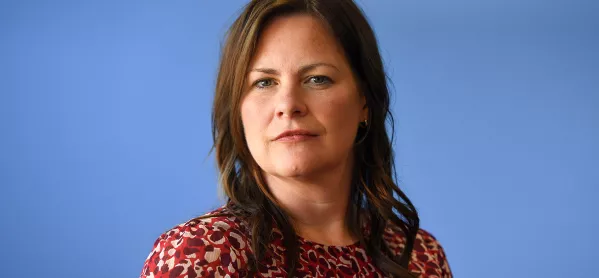Headteachers should consider having students undertake all work that contributes to exam grades in schools under exam conditions to safeguard against the rise in the use of artificial intelligence (AI) technology such as ChatGPT to complete coursework, the exams regulator chief has suggested.
Speaking at a school leaders’ conference today, Dr Jo Saxton said that innovations like the AI chatbot “reinforce the importance of the examined arrangements that have stood the test of time so well”.
The Ofqual chief said that knowing “whose work it is” is what “gives qualification currency beyond the exam hall” and ChatGPT could make a real difference to that.
“If I was running a centre now, I wouldn’t be asking for the pieces of coursework or the essays that contribute to the grade to be done at home or in school holidays, I’d be doing them in invigilated conditions and in my centre,” she said.
Dr Saxton also said she had a “whole team” working on technology in assessment but said “we’re not seeing the end of desks and pens and paper anytime soon”.
“Students are, for the foreseeable future, still going to need to be able to evidence through writing what they do understand and can do.”
Referencing ChatGPT, she added: “That innovation means that the examined approach is more important than ever because you’ve got that integrity of whose work it is.”
While Ofqual is looking at technology in assessment, Dr Saxton said it was her job to make sure that the regulator only allows things to happen “which don’t disadvantage students”.
“I think it’s right we need a national conversation about, actually, what do we want and need for the future? But we need the national infrastructure, otherwise we will just have a digital divide.
“So it’s not really about: do the technologies exist or not? It’s how can we give equal and appropriate access to them?”
And speaking to headteachers, Dr Saxton said she thought we should move to a system where offers come “after we have results”.
She said she was going to be writing to chairs and governors about this in the near future.
Last year, Colin Hughes, chief executive of AQA, told an education conference that it would be important to plan the move to online exams “carefully, nationally and executed steadily over time”.
And he said there would be “no big bangs” in the move to digital assessments.
Lower grades expected in ‘pre-pandemic normality’
Dr Saxton said that she had met with the Department for Education official for accountability this morning to set out that the government needed to explain the context of results in 2023.
She said headline and national results “are going to be lower and I think there’s there’s no getting away from that”.
“But that doesn’t mean that performance has dipped or anything has gone wrong in your school or college. It doesn’t mean something’s gone wrong with marking; it’s part of our national move back towards pre-pandemic normality.”
Last year, Ofqual announced a return to pre-pandemic grading in 2023, but with “some protection against any impact of Covid disruption”.
In summer 2022, students completed the first summer exams series after two years of cancellations owing to Covid-related disruption.




